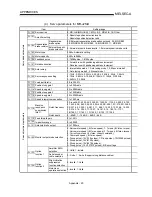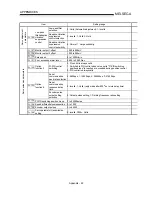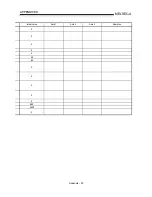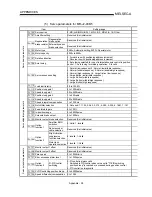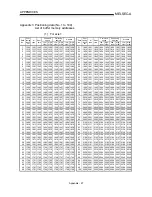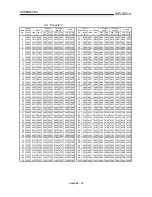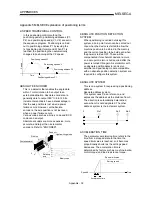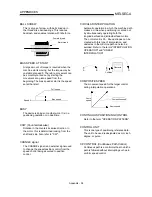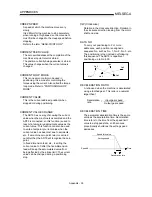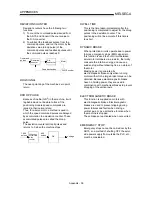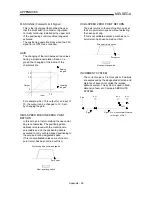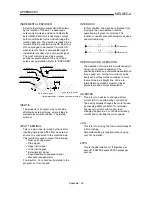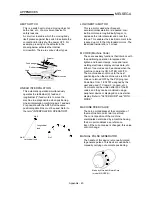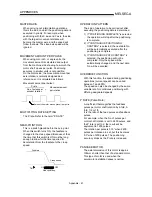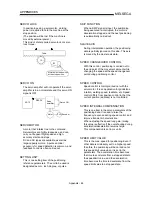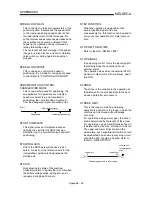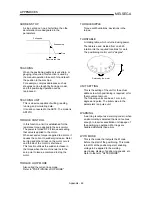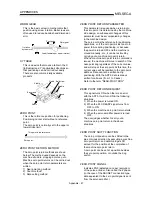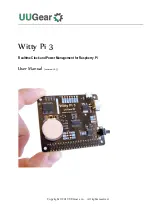
Appendix - 32
MELSEC-A
APPENDICES
Appendix 5 MELSEC Explanation of positioning terms
2-SPEED TRAPEZOIDAL CONTROL
In this positioning control method, the
positioning pattern, positioning addresses (P1,
P2), and positioning speeds (V1, V2) are set in
the sequence program. Positioning is carried
out to positioning address P1 by issuing the
1st positioning start command. When P1 is
reached, the positioning then automatically
changes to positioning at the V2 speed.
S
pee
d
Positioning speed V1
Positioning speed V2
Time
Positioning address P2
Positioning address P1
ABSOLUTE ENCODER
This is a detector that enables the angle data
within 1 motor rotation to be output to an
external destination. Absolute encoders are
generally able to output 360° in 8 to 12 bits.
Incremental encoders have a disadvantage in
that the axis position is lost when a power
failure occurs. However, with absolute
encoders, the axis position is not lost even
when a power failure occurs.
Various codes such as a binary code and BCD
code can be output.
Absolute encoders are more expensive, more
accurate, and larger than incremental
encoders. Refer to "ENCODER".
2
2
2
2
0
1
3
4
2
4
2
3
2
2
2
1
2
0
Slit disk
Phototransistor
Fixed slit
Light-emitting diode
Rotating
axis
Binary code
ABSOLUTE POSITION DETECTION
SYSTEM
When positioning is carried out using this
system, a zero point return can be carried out
once when the device is started to allow the
machine position to be stored in the memory
and the current position to be held even when
the power is turned OFF. These will be
compensated if mechanical deviation occurs,
so a zero point return is not required after the
power is turned ON again. A servomotor with
an absolute position detector and servo
amplifier and positioning module compatible
with an absolute position detection system are
required to configure this system.
ABSOLUTE SYSTEM
This is one system for expressing a positioning
address.
Absolute address system.
This system uses 0 as a reference, and
expresses the address as the distance from 0.
The direction is automatically determined,
even when it is not designated. The other
address system is the increment system.
No.1
0
No.2
No.3
ACCELERATION TIME
The parameter acceleration time refers to the
time from a stopped state to the time the
speed limit value is reached, so it becomes
proportionally shorter as the setting speed
decreases. The acceleration time is
determined by factors such as machine inertia,
motor torque, and load resistance torque.
Speed limit value
Setting speed
Speed 0
Acceleration time
Time
Summary of Contents for A1SD75M1
Page 2: ......
Page 20: ...A 18 MEMO...
Page 22: ...MEMO...
Page 27: ...1 5 MELSEC A 1 PRODUCT OUTLINE MEMO...
Page 42: ...1 20 MELSEC A 1 PRODUCT OUTLINE MEMO...
Page 52: ...2 10 MELSEC A 2 SYSTEM CONFIGURATION MEMO...
Page 111: ...5 21 MELSEC A 5 DATA USED FOR POSITIONING CONTROL MEMO...
Page 115: ...5 25 MELSEC A 5 DATA USED FOR POSITIONING CONTROL MEMO...
Page 123: ...5 33 MELSEC A 5 DATA USED FOR POSITIONING CONTROL MEMO...
Page 127: ...5 37 MELSEC A 5 DATA USED FOR POSITIONING CONTROL MEMO...
Page 167: ...5 77 MELSEC A 5 DATA USED FOR POSITIONING CONTROL MEMO...
Page 193: ...5 103 MELSEC A 5 DATA USED FOR POSITIONING CONTROL MEMO...
Page 276: ...5 186 MELSEC A 5 DATA USED FOR POSITIONING CONTROL MEMO...
Page 332: ...7 18 MELSEC A 7 MEMORY CONFIGURATION AND DATA PROCESS MEMO...
Page 334: ...MEMO...
Page 422: ...9 64 MELSEC A 9 MAIN POSITIONING CONTROL MEMO...
Page 446: ...10 24 MELSEC A 10 ADVANCED POSITIONING CONTROL MEMO...
Page 472: ...11 26 MELSEC A 11 MANUAL CONTROL MEMO...
Page 576: ...12 104 MELSEC A 12 CONTROL AUXILIARY FUNCTIONS MEMO...
Page 745: ......



